We surveyed over 1,000 adults to understand how online research impacts buying habits. Here's what we discovered:
- Massive impact on brand choices: Some 88% of shoppers have switched brands after finding a better deal online.
- Reviews rule: User-generated reviews are the #1 trusted source of information for 42% of consumers, even beating out finding the lowest price.
- Gen X loves research: Surprisingly, Gen X shoppers are the most frequent online researchers, with 38% saying they love doing it.
- Quality over price: While price matters, perceived poor quality is the biggest deal breaker for 55% of online shoppers.
Additional Key Takeaways:
- User-generated reviews (24%) beat out finding the lowest price (18%) as the first thing shoppers look for in online research.
- Having no reviews (39%) or multiple one-star user reviews (43%) are top reasons shoppers abandon a planned purchase.
- Ninety-one percent of millennials are confident in their ability to evaluate the trustworthiness of online information.
- The majority (90%) of online shoppers have published at least one or more online product or service reviews.
- 21% of people conduct online research multiple times per day, while 19% do it only once a month or less.
Almost 90% of People Have Switched Brands Based on Online Product Research
We wanted to gauge the impact of online pre-purchase research on buying habits, so we asked our survey respondents if online research has ever influenced them to switch providers or brands for better deals. A whopping 88% of survey respondents said yes.
More specifically, 26% said “yes, frequently” and another 62% said “yes, occasionally.” That left only 11% to say they had never been influenced to switch brands and 1% to note that they had never done online research before a purchase.
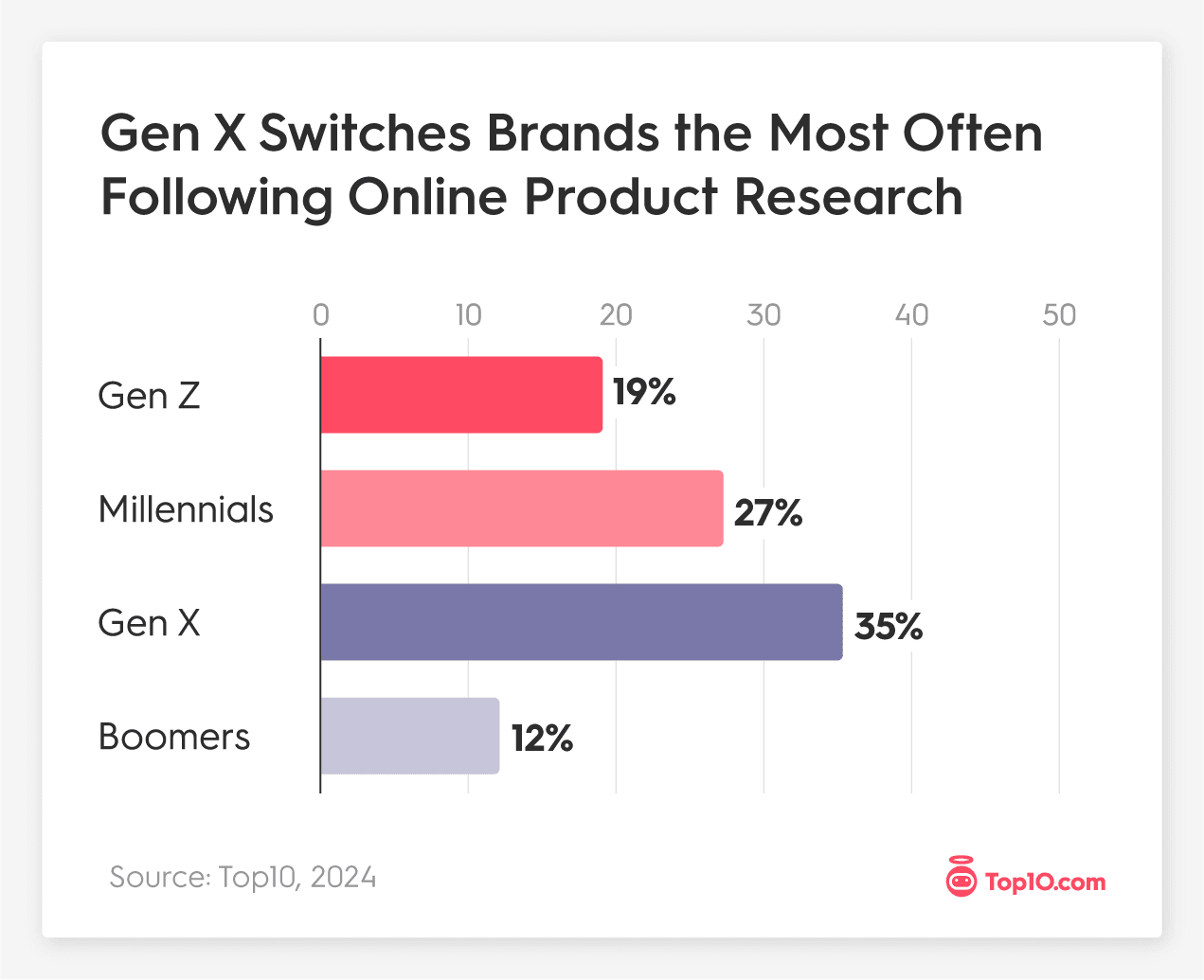
Gen X shoppers, specifically those ages 45-60, are the most frequent in shifting brands, with 35% admitting to doing so frequently. They are nearly three times as likely as baby boomers (ages 60+), at 12%, and almost twice as likely as Gen Z (ages 18-29), at 19%. At 27%, millennials (ages 30-44) ranked second for their willingness to frequently shift brands after conducting online product research.
We also inquired about the willingness of shoppers to explore lesser-known brands or providers suggested via online research, and 80% said they were at least somewhat likely to consider it.
Once again, Gen X seemed the most prepared to try something new, with 33% saying they were “very likely” to consider the idea. The majority of millennials preferred “likely” as their response, at 34%. Both Gen Z (33%) and boomers (39%) opted for the more cautious answer of “somewhat likely.”
Over 40% of Shoppers Say Reviews Are Their #1 Trusted Source
To uncover the public’s most trusted online source for product information, we asked where they initially look for information before making a purchase. It was a tight race, but three responses stood at the top of the list:
- Retailer’s product descriptions (including specs and product details): 26%
- Comparison product review sites: 21%
- User-generated reviews on the company’s website: 21%
While product descriptions took the top spot, we discovered that more people rely on reviews than any other information source. With 42% of the vote between comparison product review sites and reviews on a company’s website, the opinions of fellow consumers and industry experts carry a lot of weight.
Millennials are the most reliant on comparison sites, such as Top10.com, with 26% saying that’s their first stop in their shopping research journey. The top choice for all other generations was the retailer’s product descriptions:
- Gen Z: 26%
- Gen X: 29%
- Boomers: 33%
Study results also challenged the assumption that recommendations from influencers and comments from social media would rank high with young adults. Only 8% of Gen Z felt influencers’ opinions were most important, and 8% felt social media comments were the best option for product research.
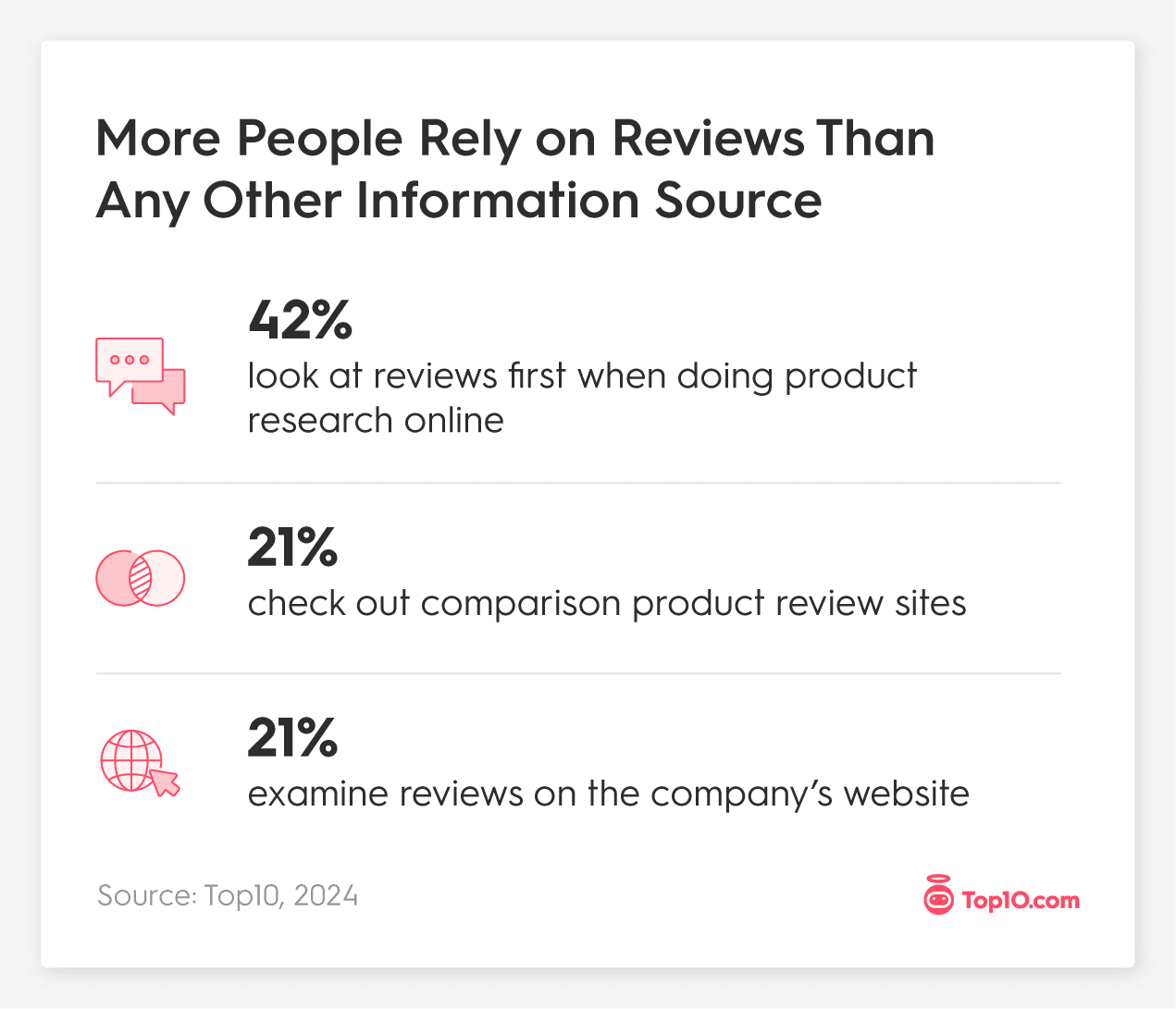
We also wondered about the most helpful online information when someone grabs their phone or cracks open their laptop to search for the perfect product or service.
When asked, 24% of shoppers surveyed told us that “finding reviews and ratings from other customers” was their top priority. We were surprised to learn that those reviews were more important than “finding the lowest price” (18%). In fact, price came in as the third highest priority, with “learning as much as possible about a specific product they’re considering” coming in second with 20%.
The findings also revealed that men prioritize product details and information, while women look for opinions from other shoppers. Twenty-two percent of men said they want to learn as much as possible, compared to 18% of women saying the same. Twenty-seven percent of women said finding reviews from other customers was their top priority, in contrast to 20% of men.
1-Star Reviews Scare 43% Away from Purchases
Good and bad reviews play an important role in consumer purchasing decisions. Our team discovered that finding multiple one-star reviews is an absolute deal breaker for 43% of consumers. Even a lack of reviews can be considered a red flag. According to 39% of respondents, products or services with zero reviews are a big concern.
But in today’s modern world, not all reviews can be trusted—even the one-star reviews. Amazon is rife with fake reviews written by bots. Companies may use fake reviews to improve the public perception of their products or services. False bad reviews may be used against a competitor to damage their reputation.
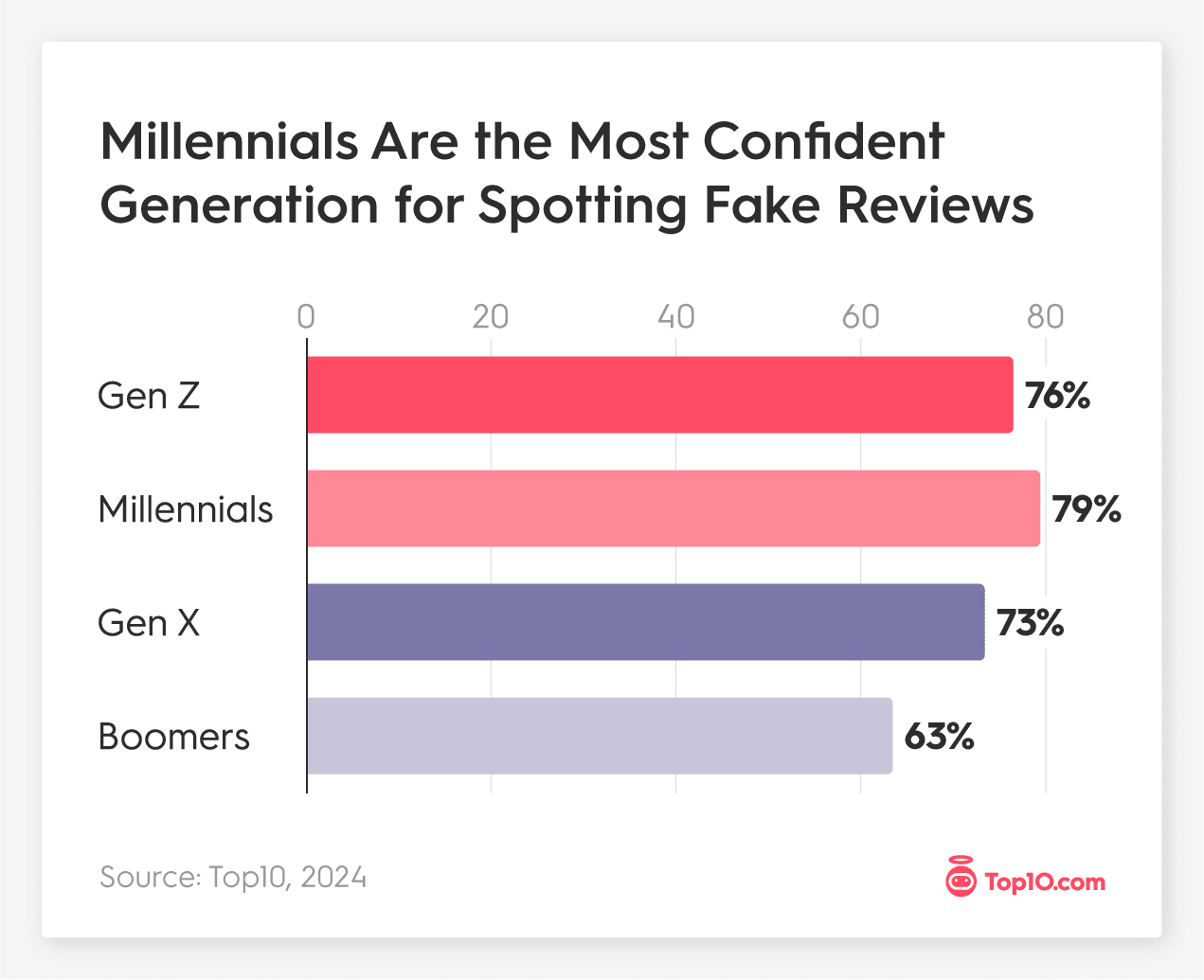
The Federal Trade Commission offers tips on how to evaluate online reviews. But we found it interesting that 3 out of 4 shoppers already feel at least “somewhat confident” that they can spot fake reviews online. Of those shoppers, only 18% feel “extremely confident.”
We measured the combined confident responses by age, including “extremely confident,” “very confident,” and “somewhat confident,” to determine the most confident generation.
Millennials stood out as the most confident in terms of identifying fake online reviews and evaluating the trustworthiness of information they find online prior to making a purchase. Here’s how their confidence levels stacked up.
Spotting fake online reviews:
- Gen Z: 76%
- Millennials: 79%
- Gen X: 73%
- Boomers: 63%
Evaluating the trustworthiness of online information:
- Gen Z: 82%
- Millennials: 91%
- Gen X: 88%
- Boomers: 87%
One recent study showed that clearly identifying fake reviews is no easy task, revealing that consumers generally trust negative reviews more than positive ones.
55% Say the Biggest Deal Breaker to Making a Purchase Is Perceived Poor Product Quality
Bad reviews are not the biggest concern for our survey respondents. Surprisingly, price was also not the main issue (it came in fourth).
When asked, “Are there any deal breakers that will prevent you from making a purchase online?” 55% said poor product quality would make them walk away. Note that we did not clarify exactly how they determined the product’s quality, whether it was through personal experience, feedback from friends and family, or online research.
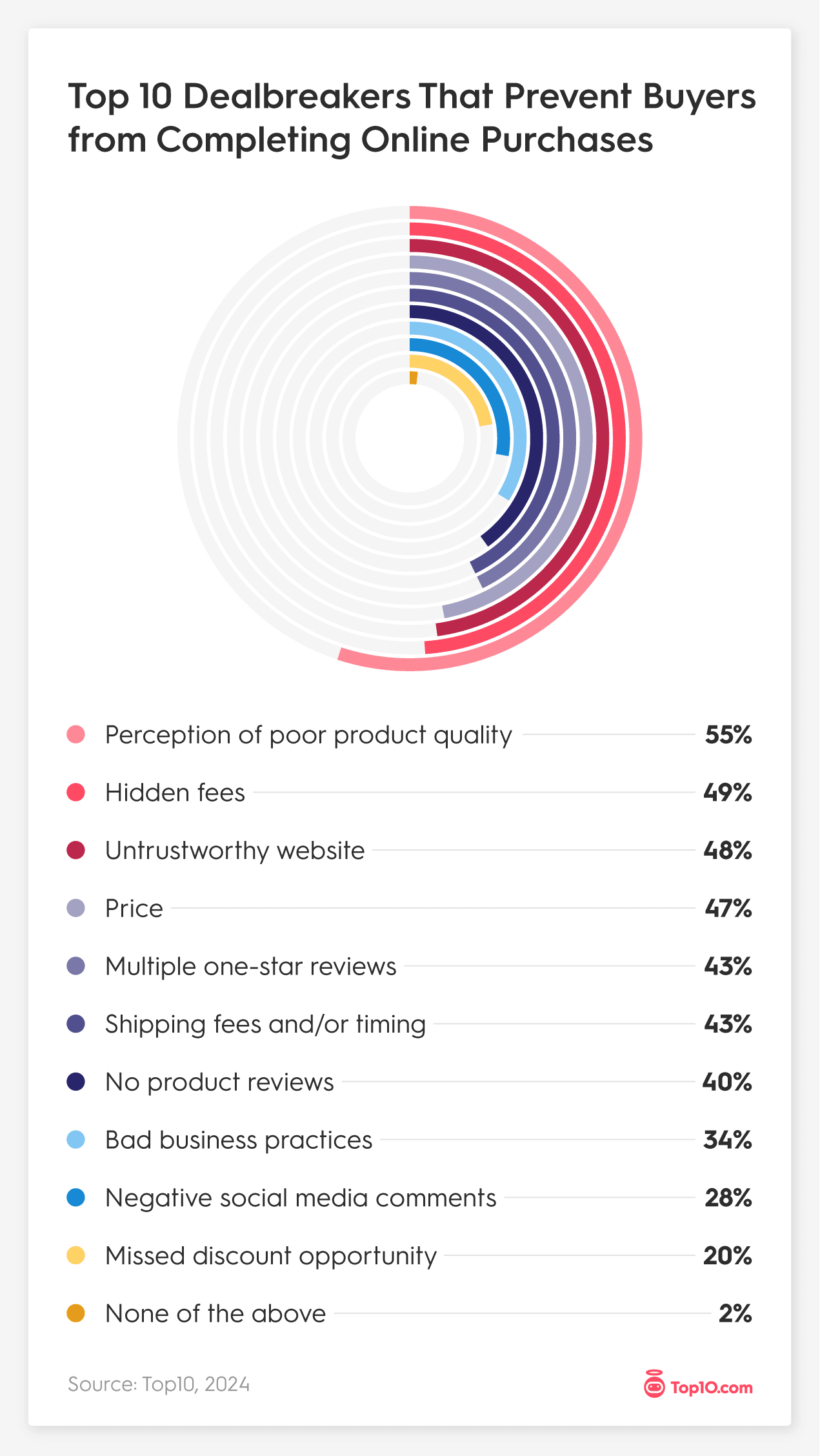
The top three factors shoppers found more important than price are all issues of trust:
- Poor quality: 55%
- Hidden fees: 49%
- Untrustworthy website: 48%
- Price: 47%
Consumers who lose confidence in a company’s dedication to manufacturing quality products or services will make their purchases elsewhere. And shoppers pay attention to businesses that use hidden fees to increase their revenue, often so they can avoid them in the future.
Only 10% Have Never Written a Product Review
Ninety percent of online shoppers have written at least one or more reviews for products or services they’ve purchased. Most people (39%) write them occasionally, but 26% admit they write them frequently. Only 10% of respondents state that they have never written a product review.
Research shows that 71% of consumers asked to give a review are likely to do so if they feel the company made it easy to submit. When you add TikTok testimonials and other social media platforms that make it easier than ever to share your opinions, anyone can be a critic who gets heard.
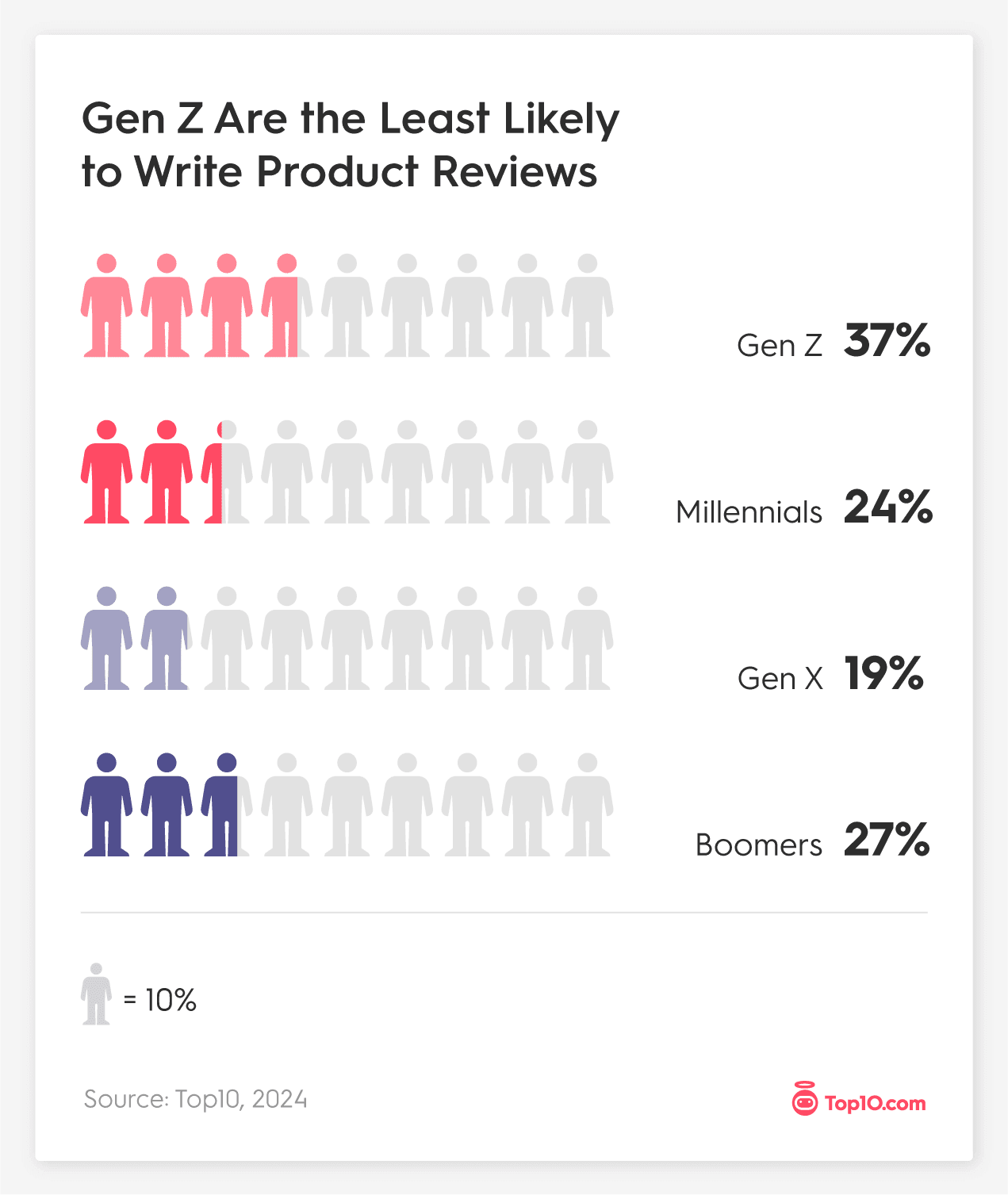
Upon examining the generational breakdown of the survey results, we noted that, although Gen Z does write reviews, they do it the least often. The most popular answer among Gen Zers was “rarely,” at 37%. That’s a 10% difference from everyone else—boomers came in at 27%, millennials at 24%, and Gen X at 19% for the same response.
Over 60% of Shoppers Research Products Multiple Times Weekly Before a Purchase
Almost 80% of people conduct pre-purchase research online at least once a week, while 61% do it more than once a week. Twenty-one percent indulge in online research multiple times every single day. In contrast, 1 in 5 only engage in online research once per month or less often.
The high rate of research done prior to online purchases aligns with the popularity of online shopping around the world. In the United States, 43% of consumers prefer to shop online, compared to 27% who prefer in-store. Those numbers shift to 35% online and 26% in-store in the United Kingdom.

The most popular response among the general population was “several times a week,” accounting for 31%. These results held true across generations, too.
Several times per week:
- Gen Z: 28%
- Millennials: 31%
- Gen X: 30%
- Boomers: 38%
67% Enjoy Doing Online Product Research
The majority (67%) of people enjoy the time they take to do online product research, with 27% loving it and 40% liking it. Barely 5% of people dislike or hate it, while 28% have only neutral feelings about it.
These findings suggest that online research has become an integrated part of the shopping experience for many, allowing them to feel informed and confident before making a purchase.
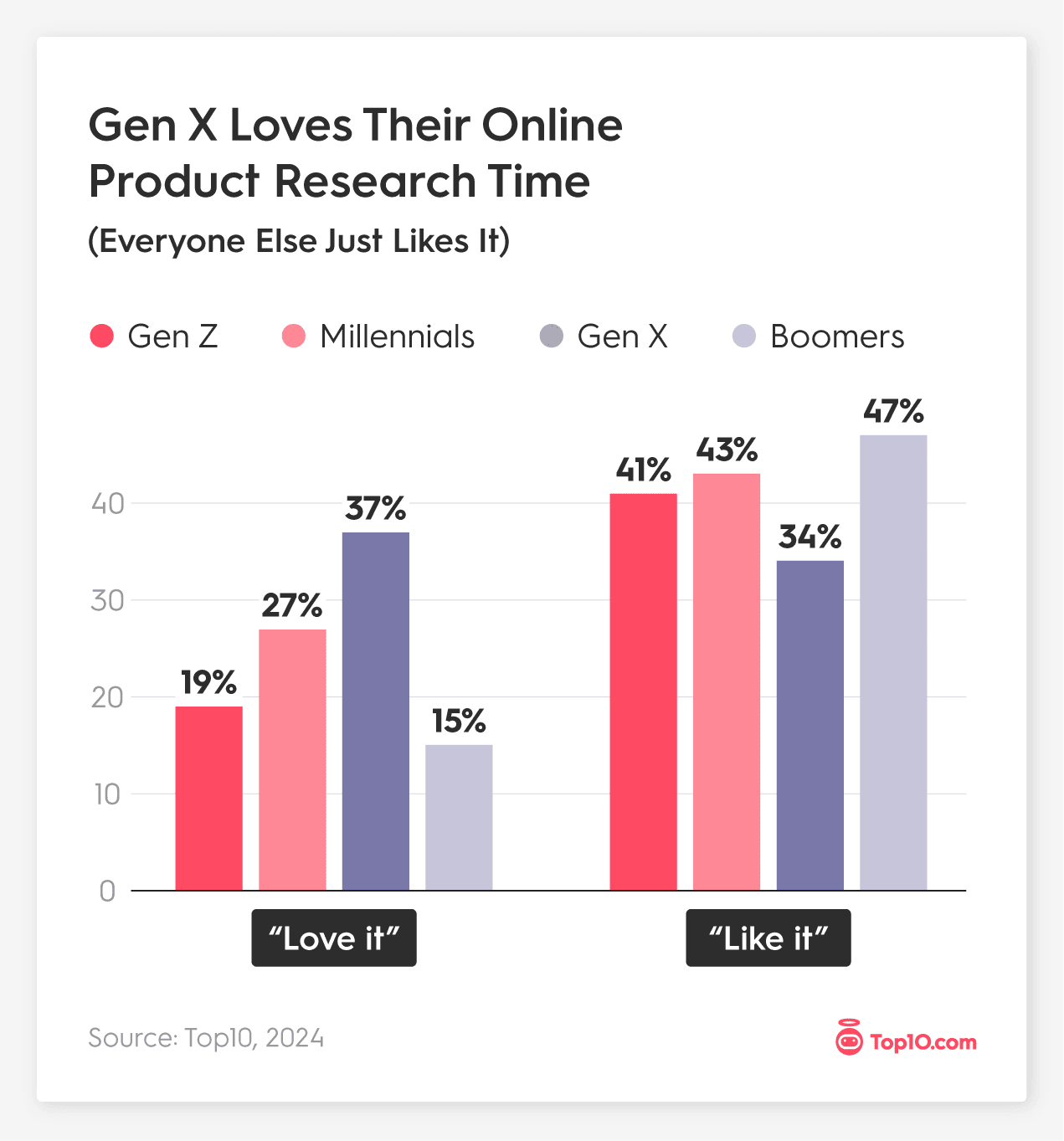
Gen X shoppers (71%) have shown they’re the happiest about doing online product research. Millennials placed a close second at 70%. Both Gen Z and boomers hovered about 10 percentage points below, at 60% and 62%, respectively.
Avoid Buyer’s Remorse by Comparing Popular Products First
Taking the time to do some research online before making a purchase is a smart choice. It can save you time, money, and the frustration of dealing with issues that may arise from a bad deal.
No matter where you look for online product or service information first, a simple search can provide a starting point on your shopping journey. Sites like Top10.com prioritize making sure the experts who write their product and service reviews are trustworthy.
Methodology
The survey of 1,038 adults ages 18+ was conducted via SurveyMonkey Audience for Top10.com on April 16, 2024. Data is unweighted and the margin of error is approximately +/-3% for the overall sample, with a 95% confidence level.

